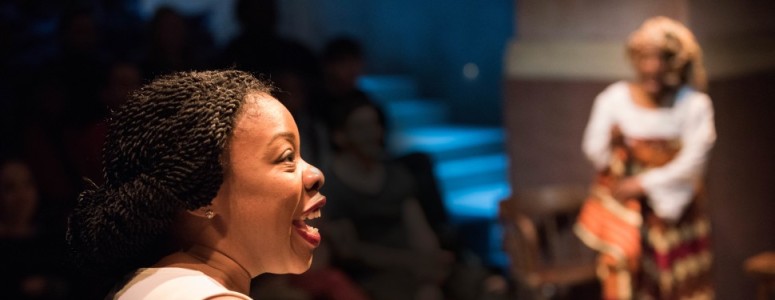What a bitch.
That’s a terrible thing to say about anyone, of course, but let the punishment fit the crime in the case of Kelechi.
She’s the title character in THE HOMECOMING QUEEN at Atlantic Stage 2, although she hasn’t won the title at some suburban high school.
Actually, in Ngozi Anyanwu’s new play, she’s a self-proclaimed “starving artist” who was born in Nigeria but convinced her wealthy father to have her educated in America. Now 15 years later, it’s her homecoming, and, oh, does she ever act as if she’s a queen.
Her halting and measured “How. Are. You.” to the natives rings of condescension; the words that follow reek of imperiousness. Each of her smiles is super-supercilious.
Kelechi excuses herself, however: “Jet lag. You understand.”
No, these people who have never been on an airplane most certainly do NOT understand.
When Kelechi reunites with her Papa, she isn’t above correcting his word-usage. She’s quite the interrupter, too – the kind who won’t stop talking until the other person finally succumbs.
So five minutes into the play we already don’t have much – nay, any — sympathy for Kelechi. Only those who start warring with a parent seconds after arriving home for a visit could possibly relate to her.
The real surprise comes in the following scene. Despite that “starving artist” claim, Kelechi has actually penned a Number One Best-Seller. Leave it to this glass-is-totally-empty woman to point out that the book lost a prestigious prize.
Kelechi is nasty to Nigerians old and young; she treats young girl servant Beatrice as a slave. Listening to her on the phone with her agent reveals that she’s an equal-opportunity shrew. When Kelechi won’t do what the agent wants, she snarls “I made a lot of money for you!” To her, that’s a case-closed rebuttal.
Only Justin Bieber may have a greater sense of entitlement.
What’s also revealed is that Kelechi is an inveterate pill-popper. The first excuse is “I don’t want to catch anything” but the medication goes deeper than that. Frankly, after 15 minutes with this “queen” who makes “Bloody Mary” I of England seem like a rookie city councilman, we also need a Valium or two.
Romance? Kelechi admits that her last relationship didn’t work out. (What a surprise!) Some sparks may yet fly with native Obina, for he and Kelechi grew up together. That history may be enough to start something between them. It’s a rare play where we don’t want the guy to get the girl, but this is certainly one of them.
Even a play that’s only 105 intermissionless minutes long can’t keep up a character’s atrocities at a non-stop pace, so Anyanwu does let us see Kalechi vulnerable when she muses about her now-deceased mother. But Kelechi soon follows that by what she perceives as another annoyance and mutters “Now I know why I never visit.”
And this is the most unpleasant visit since Nick and Honey dropped in on George and Martha.
In a scenario such as this, one of two things can happen. Kelechi can get her comeuppance in a marvelously unexpected way or she can straighten out and become a better person. The choice Anyanwu makes for her character may be the less arresting one (although you may feel differently).
Nevertheless, under Awoye Timpo’s taut direction, Mfoniso Udofia’s portrayal of Kelechi is so effective that it’s a wonder she didn’t get hissed during much of the play. Oberon K.A. Adjepong brings great dignity and wisdom to Papa. Segun Akande is appropriately deferential – at least for a while – as Obina. Mirirai Sithole gives the type of performance that always has us wondering what Beatrice is really thinking and if she’ll eventually reveal it.
(Memo to Ms. Sithole: George Gaynes was George Jongeyans for the first few years of his career. It’s not too late to change your surname.)
Papa tells Kelechi on more than one occasion that she should have “commitment, dedication, knowledge, perseverance and common sense.” How nice that, for the most part, the playwright has taken her own advice. But, Ms. Anyanwu, may we have someone we can like in your next play?




